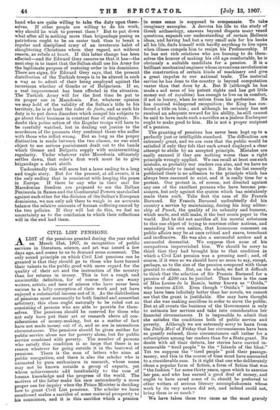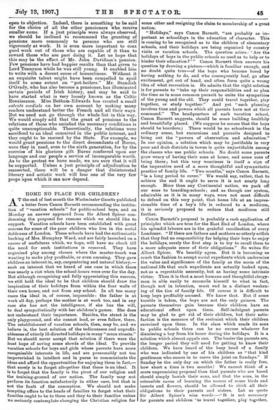CIVIL LIST PENSIONS.
ALIST of the pensions granted during the year ended on March 31st, 1907, in recognition of public services in literature, science, and art was issued a few days ago, and seems to us to demand some comment. The only sound principle on which Civil List pensions can be granted is that they should go to those who have turned their talents to the public good with more regard for the quality of their art and the instruction of the country than for returns in money. This is but a rough and unscientific definition, for of course there are many writers, artists, and men of science who have never been untrue to a lofty conception of their work and yet have enjoyed a substantial income out of it. As the distribution of pensions must necessarily be both limited and somewhat arbitrary, this class ought naturally to be ruled out as consisting of persons who are able to provide for them- selves. The pensions should be reserved for those who not only have put their art or research above all con- siderations of money-making, but as a matter of fact have not made money out of it, and so are in necessitous circumstances. The pensions should be given neither for public service alone nor for poverty alone, but for public service combined with poverty. The number of persons who satisfy this condition is so large that there is no reason whatever for going outside it in the bestowal of pensions. There is the man of letters who aims at public recognition, and there is . also the scholar who is animated by pure enthusiasm in research, whose name may not be known outside a group of experts, yet whose achievements add incalculably to the sum of human knowledge and the progress of the world. The motives of the latter make his case antecedently a more proper one for inquiry when the Prime Minister is deciding how to grant Civil List pensions. The scholar we have mentioned makes a sacrifice of some material prosperity td his conscience, and it is this sacrifice which a pension in some sense is supposed to compensate. To take imaginary examples. A devotes his life to the study of Greek archaeology, answers beyond dispute many vexed questions, expands our understanding of certain Hellenic ideas, and having had but a very small sale for his books all his life, finds himself with hardly anything to live upon when illness compels him to resign his Professorship. If he has not rich relations who are burning to do them- selves the honour of making his old age comfortable, he is obviously a suitable candidate for a pension. B is a brilliant mechanical engineer whose inventions revolutionise the construction of certain kinds of machinery and give a great impulse to our national trade. The material service he has done to the country is beyond computation vaster than that done by A. But B (although he has made a sad mess of his patent rights and has got little money out of royalties) has enough to live on in comfort, if not in luxury, when he retires from his profession. He has received widespread recognition ; the King has con- ferred a title on him; and although he certainly has not received an adequate reward for his ability, he still cannot be said to have made such a sacrifice as a jealous Exchequer ought to make good to him. He is not a proper recipient of a pension.
The granting of pensions has never been kept up to a perfectly just or intelligible standard. The difficulties are extremely great, and we are sure that the public would be satisfied if only they felt that each award displayed a clear attempt to abide by an accepted principle. Mistakes are easily excused if they are nothing worse than a right principle wrongly applied. We can recall at least one such mistake, as probably our readers can also, and we have no wish captiously to insist upon it. But in the list recently published there is no adhesion to the principle which has always been assumed to exist, and it is really time for a protest. Our protest is, of course, not directed against any one of the excellent persons who have become pen- sioners, but only against the system which has mistakenly made them such. Take first the case of Sir Francis Burnand. Sir Francis Buruand undoubtedly did his country a service by maintaining, during his long editor- ship of Punch, the quality of its urbanity and humour, which made, and still make, it the best comic paper in the world. But he did not sacrifice all his mental substance to this one object of trying to convince other nations, and reminding his own nation, that humorous comment on public affairs may he at once critical and suave, trenchant and inoffensive. He was also a successful author and a successful dramatist. We suppose that none of his occupations impoverished him. We should be sorry to think that they had brought him to that condition •in which a Civil List pension was a pressing need ; and, of course, if it were so we should have no more to say, except, perhaps, as to the size of the pension compared with those granted to others. But, on the whole, we find it difficult to think that the selection of Sir Francis Burnand for a pension of £200 can be justified. Then there is the case of Miss Louise de la Ram6e, better known as " Ouida," who receives £150. Even though " Ouida's " intentions may have been infinitely better than her novels, we cannot see that the grant is justifiable. She may have thought that she was making sacrifices in order to serve the public. But at all events the business of the Government is only to estimate her services and take into consideration her financial circumstances. It is impossible to admit that she satisfies the conditions both of public service and poverty. Although we are extremely sorry to learn from the Daily Mail of Friday that her circumstances have been so greatly reduced, those circumstances call rather for a subscription among her readers than for a State grant. No doubt with all their defects, her stories have carried in- numerable " tired people " to the " Islands of the blest." Yet we suppose the " tired people " paid their passage money, and this in the course of time must have amounted to a considerable sum. Is it right that one who deliberately chose a popular form of fiction, a form of fiction that was " the fashion " for some thirty years, upon which to exercise her pen, and who has earned a good deal of money, and ought to have saved some of it, should be preferred to other writers of serious literary accomplishments whose work by its very nature did not, and indeed could not, bring them in so much ?
We have taken these two cases as the most gravely open to objection. Indeed, there is something to be said for the choice of all the other pensioners who receive smaller sums. If a. just principle were always observed, we should be inclined to recommend the granting of pensions more commonly to persons who are still vigorously at work. It is even more important to coax good work out of those who are capable of it than to reward those who are past doing it. Let us hope that this may be the effect of Mr. John Davidson's pension. Few pensions have had happier results than that given to Lord Tennyson while he was still young. It enabled him to write with a decent sense of leisureliness. Without it an exquisite talent might have been compelled to spoil itself to some extent on "pot-boilers." Mr. Standish O'Grady, who has also become a pensioner, has illuminated certain periods of Irish history, and may be said to have started what is very loosely known as the Celtic Renaissance. Miss Betham-Edwards has created a small entente cordiale on her own account by making many readers understand better the French and all their ways. But we need not go through the whole list in this way. We would simply add that the grant of pensions to the relations of those who satisfied the necessary conditions is quite unexceptionable. Theoretically, the relations were sacrificed to an ideal conceived in the public interest, and they ought to be rescued by the State. For example, we would grant pensions to the direct descendants of Burns, were they in need, even to the sixth generation, for by the exercise of his glorious gift Burns conferred upon our language and our people a service of incomparable worth. As to the protest we have made, we are sure that it will be supported. Unless a just principle of adjudication be reasserted, there will be a danger that disinterested literary and artistic work will lose one of the very few props upon which it can now depend.







































 Previous page
Previous page